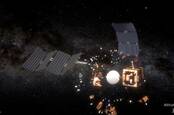This article is more than 1 year old
Relax, satellite hacking is unlikely to lead to Earth-blinding Kessler effect – at least not yet
But this hardware is surprisingly easy to pwn, block and control
Bsides LV A satellite-killing debris field encircling the Earth isn't coming any time soon, but hackers working from Earth could help severely damage the planet's orbital traffic.
Satellite systems specialist Elizabeth Wilson presented research to the Bsides hacking conference in Las Vegas showing that our machinery in orbit – and the humans and ground stations controlling it – are astonishingly easy to hack.
Once control is lost, the satellite could be induced into the Van Allen radiation belt to kill its systems, or induced to crash into other orbiting platforms, creating a debris field that could have serious knock-on effects.
"It probably wouldn't be as bad as that," she told The Register, referring to the film Gravity, where the destruction of a Space Shuttle after a catastrophic debris collision starts off the self-sustaining cascading event known as the Kessler Syndrome. "But it could certainly reach a stage where putting new satellites into orbit would be very difficult."
The current biggest threats to satellites are physical – solar radiation and flares that can fry electronics. But debris is also a major concern, particularly in light of anti-satellite missile tests carried out by China in 2007, the US in 2008, Russia in 2015, '16 and '18, as well as India's test this year – not to mention French plans for machine guns in space.
A single piece of debris one centimetre across could damage a satellite, Wilson said, and a 10cm chunk would most likely cause "catastrophic damage". The situation has become even more complicated in recent years thanks to the deployment of Cubesats – small orbital vehicles without the propulsion to shift out of harm's way.
But what if hackers took over a larger satellite's control systems and intentionally crashed it into another chunk of hardware? Many satellites don't bother to encrypt their signals because it takes up too much processing power and in many security wasn't even considered.
She cited Iridium, the global satellite telephony system, as one example, where designers thought their system was so complex they didn't need security. "The complexity of the Iridium air interface makes the challenge of developing an Iridium L-Band monitoring device very difficult and probably beyond the reach of all but the most determined adversaries," a leaked 2007 slide reveals.
The Chaos Computer Club took this as a challenge and found that with $70 worth of hardware they could intercept between 35 and 50 per cent of Iridium signals. The satellite's security has since been upgraded.
Ultimately, nation states need to come to an international agreement on satellite security standards, Wilson opined, as well as on the issue of space debris. While we haven't gone full Kessler effect yet, that day may be in our futures. ®

